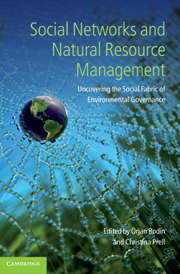 Social Networks and Natural Resource Management
Social Networks and Natural Resource Management from Part II - Case studies
Published online by Cambridge University Press: 05 June 2012
The challenges of natural resource governance
It is generally agreed that adaptability – as in the capacity to react and respond to social and ecological change – is a desirable quality of systems governing natural resources (Holling, 1978; Walters, 1986; Folke et al., 2002). Even so, the complex nature of environmental problems makes adaptive governance a far from straightforward task. In addition to the inherent complexity and unpredictability of the natural environment, social processes related to natural resources are often ridden with conflict and feature great uncertainty regarding the substance of the problem, the strategies of other actors, and the overall institutions governing such processes (Koppenjan and Klijn, 2004). In striving for adaptability, governance is faced with various challenges originating from collective action problems, from the existence of divergent and competing interests, values, and problem definitions, and from the fact that ecological knowledge more often than not is contested (Olson, 1965; Hardin, 1968; Hoppe, 1999; Koppenjan and Klijn, 2004). These features significantly aggravate the processes of reaching a joint image regarding the state of the resource and appropriate management rules, which is absolutely essential for adaptive management to evolve. Thus, the social challenges of adaptive governance are many. There is therefore a constant search – among both policy makers and researchers – for the type of governance system that can promote the rise and subsistence of social processes dealing with these challenges in an efficient way.
To save this book to your Kindle, first ensure [email protected] is added to your Approved Personal Document E-mail List under your Personal Document Settings on the Manage Your Content and Devices page of your Amazon account. Then enter the ‘name’ part of your Kindle email address below. Find out more about saving to your Kindle.
Note you can select to save to either the @free.kindle.com or @kindle.com variations. ‘@free.kindle.com’ emails are free but can only be saved to your device when it is connected to wi-fi. ‘@kindle.com’ emails can be delivered even when you are not connected to wi-fi, but note that service fees apply.
Find out more about the Kindle Personal Document Service.
To save content items to your account, please confirm that you agree to abide by our usage policies. If this is the first time you use this feature, you will be asked to authorise Cambridge Core to connect with your account. Find out more about saving content to Dropbox.
To save content items to your account, please confirm that you agree to abide by our usage policies. If this is the first time you use this feature, you will be asked to authorise Cambridge Core to connect with your account. Find out more about saving content to Google Drive.